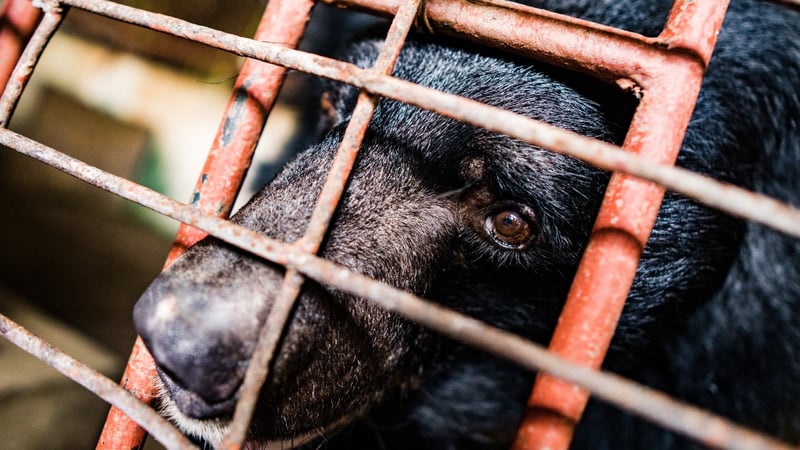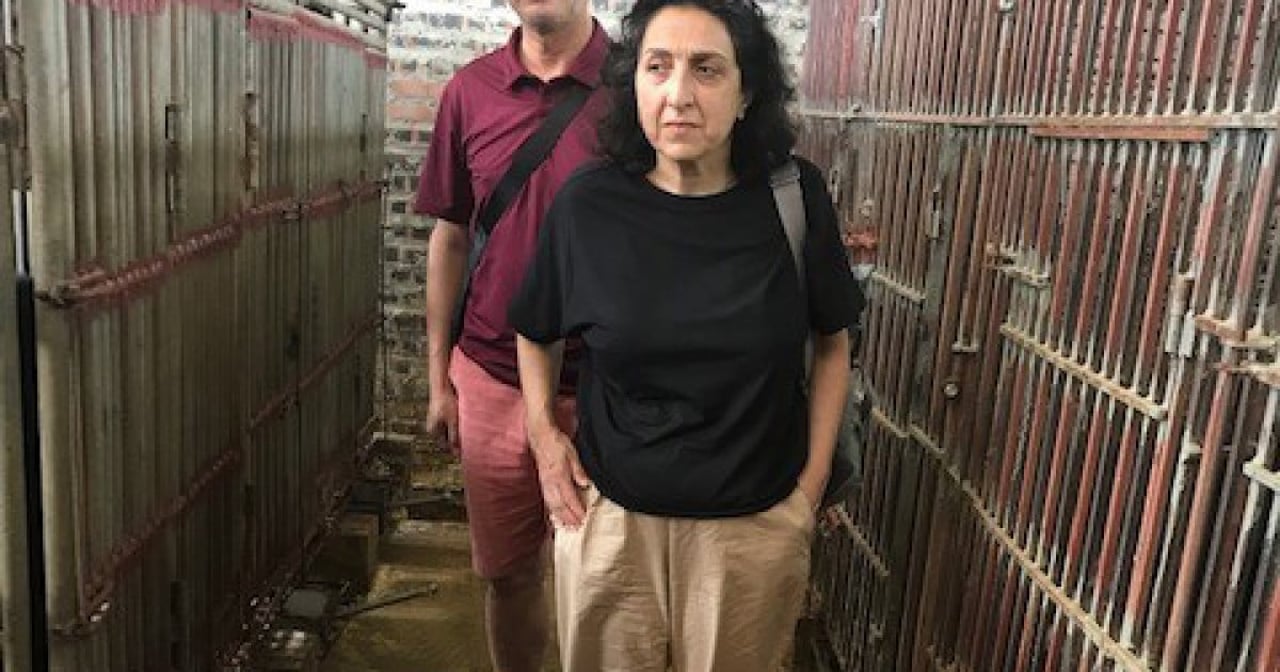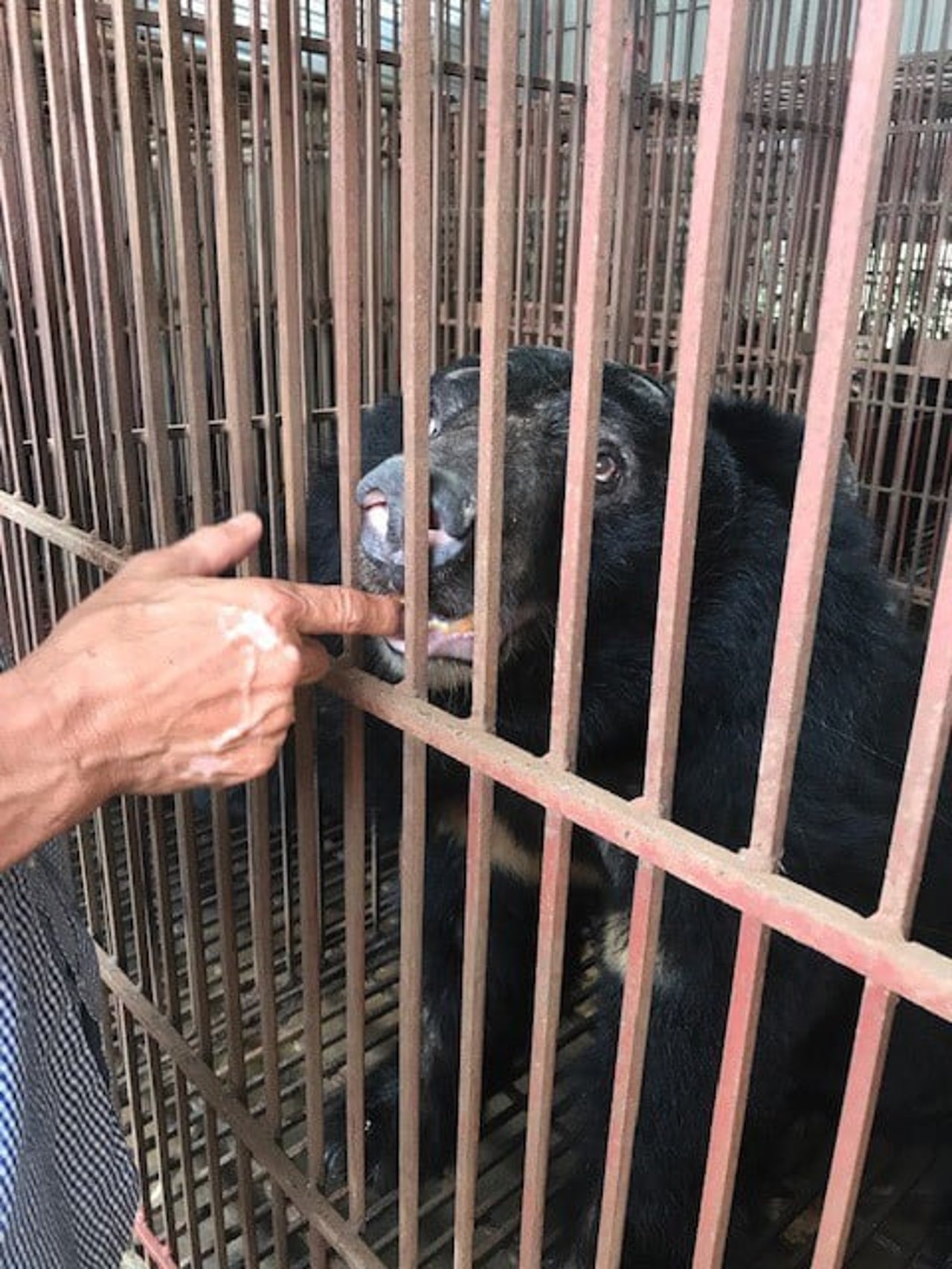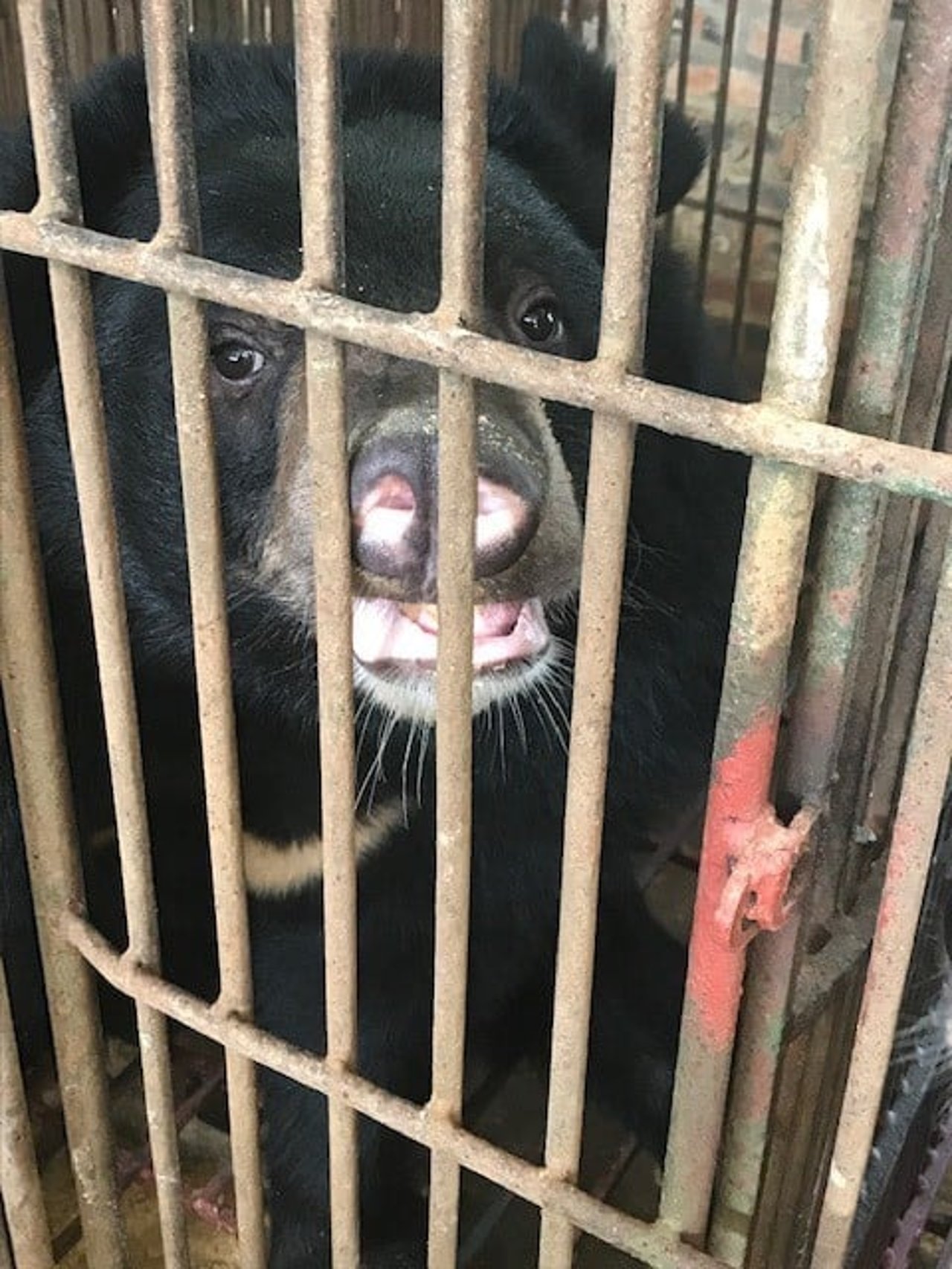
Maya Pastakia, our International Campaign Manager, recently came face-to-face with bear bile farming, one of the worst forms of animal abuse today.
The (unjustified) use of bear bile
In Vietnam, hundreds of bears live a torturous life in captivity for their bile harvested for use in traditional Asian medicine and health products, even though bear bile farming is illegal in the country.
It is one of the most extreme forms of animal abuse today. Their suffering is wholly unjustified as plant-based, and synthetic alternatives are readily available in traditional Asian medicine.
The torturous life of bile bears
Here I saw bears confined to tiny cages not much bigger than a telephone booth, deprived of natural sunlight, unable to stretch out, lethargic, enduring disease, pain and distress – this is how these bears have spent much, if not all, of their lives, a lifespan that for the most part has stretched to 20 years.
The farm contained two rows of rusty cages in a darkly lit room containing the saddest-looking bears. As I was talking to the bear owner, I realised there was an unfathomable disconnect between the affection he felt for his bears (he was petting them as we spoke) and the suffering he was putting them through.
Fifteen bears are kept in cages with steel bars for flooring; they cannot climb trees, play and forage for food as they would in the wild. They are fed a bland unnatural diet of gruel, made from milk powder or corn powder and eggs.
Maya Pastakia, International campaign manager - Animals in the wild and Phuong Le Duy, World Animal Protection bear consultant in Vietnam, visiting a bear farm in Phuc Tho, a rural district of Hanoi.
The complexities of bear ownership and surrender
Although most bear owners illegally extract bile from their bears, this owner denied that bile extraction was happening on his farm, though this is questionable. When I encouraged the owner to turn over his bears to a sanctuary, it was clear that he was holding out for compensation:
“I paid a lot of money for these bears. I will only transfer them if the government pays me for them”.
As tempting as paying off owners to end their suffering might be, such a move could prolong their agony. There is a real danger that owners will hold on to their bears to obtain a higher level of compensation in exchange for their bears.
Many bear owners are attached to their bears but there is an unfathomable disconnect between the cruelty and suffering that they are putting their bears through and the affection that they have for them.
This has been the experience in South Korea, where World Animal Protection campaigned for many years to end bear bile farming. Moreover, any compensation scheme would also reward owners who obtained their bears illegally from the wild, undermining the rule of law and law enforcement. It could encourage owners to keep and exploit other wild species in captivity as a money-making business.
It's shocking that the life of a sentient animal capable of suffering is worth so little.
Bile bears are confined to small cages not much bigger than a telephone booth, deprived of natural sunlight, unable to stretch out, lethargic, enduring disease, pain and distress
World Animal Protection's work to end the bear bile industry
In this respect, I feel privileged to be part of the wildlife team at World Animal Protection. In Vietnam, we have worked tirelessly for almost two decades to end the cruel bear bile industry.
Partnerships
In 2005, we partnered with Vietnam’s Ministry of Agriculture and Rural Development and secured a landmark agreement to phase out bear bile farming there.
At the time, around 4,300 bears were held on farms. With our local partner, Education for Nature Vietnam, we provided equipment and training for microchipping these bears.
All 4,300 bears were officially registered and microchipped to prevent new bears from the wild from entering the farms.
Microchipping
The government and World Animal Protection also initiated an extensive monitoring programme to inspect the farms once microchipping was completed.
Any bears found without a microchip and/or registration papers are deemed illegal, confiscated, and taken to a government rescue centre or one of the sanctuaries operated by Four Paws, Free the Bears or Animals Asia Foundation.
Visiting farms
Our visits to bear farms have made headway in ending bear bile farming. It provides an opportunity to convince bear owners to turn over their bears to sanctuaries voluntarily. With the steady turnover of bears, we have reached a tipping point.
Progress
Today, there are more bears in sanctuaries and rescues (335 bears) than held captive on farms (257 bears), a reduction of 94% bile bears on farms.
Freedom! The life of bears who survive the bear bile industry
Thankfully, during my trip, I saw our work's positive impact.
A visit to Four Paws bear sanctuary in Ninh Binh, 94km south of Hanoi, lifted my spirits; bile bears are resettled in the equivalent of a five-star hotel.
There are outdoor enclosures for roaming and playing, set against a stunning scenic backdrop, and indoor dens where the bears can also take shelter and relax. A dedicated veterinary team and a fleet of caregivers on site handle their physical and emotional needs. The bears are given nutritious, balanced meals three times a day tailored to their health needs.
Irreversible trauma
Sadly, however, they come with a host of ailments on their arrival at the sanctuary.
“The bile bears that we receive suffer from gallbladder infections, gall stones, kidney failure, spinal disease, high blood pressure and heart problems due to stress, as well as dental troubles. Most of the bears recover emotionally and physically. Still, it can take time for them to adapt due to the years of trauma they’ve suffered,” said Chief Veterinarian Marc Goelkel, “but sadly, some never fully recover”.
Many exhibit signs of trauma in the form of abnormal behaviours. Bears initially separated from their mother repeatedly lick themselves to calm themselves down, while others display self-mutilation like biting and scratching themselves.
Most of the bile bears who come to the sanctuary cannot be released back into the wild as they cannot develop the skills that would allow them to survive in the wild.
Bears deserve more than just a life, but an enriching life
A clear aim at Ninh Binh Sanctuary is to promote natural behaviours to help the bears rediscover their ability to live a normal, wild life as much as is possible. The staff do this by providing continual “enrichments”, such as climbing structures, as well as encouraging swimming in the wading pools and foraging for food.
As much is heartening to see the bears being given a better life at this wonderful sanctuary, I couldn’t help but feel that bear farmers should never have cruelly exploited them for the bear bile trade.
The sun is finally setting on bear bile farming
It is reassuring that after nearly 20 years, the sun is finally setting on bear bile farming in Vietnam.
World Animal Protection will continue to work with the government and our local partners, Four Paws and Education for Nature Vietnam, and other NGOs, to bring about an end to bear bile farming once and for all so that all remaining bears on farms are the last generation to be exploited and suffer life in captivity.


